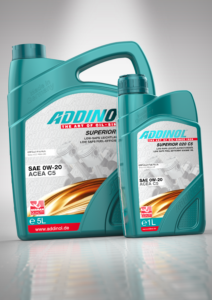


New technology, new engine oils – the ACEA C5 specification
The ACEA specifications (Association des Constructeurs Europeens de l’Automobile) represent the largest common standard for the requirements of European vehicle manufacturers for engine oils.
ACEA distinguishes between engine oils in terms of their suitability for a specific engine type or exhaust aftertreatment technology. Class A and B describe “High SAPS” oils for conventional gasoline and diesel engines. Class C contains “Low or Mid-SAPS” oils for vehicles with state-of-the-art exhaust aftertreatment systems. They require special engine oils to prevent blockages of the diesel particulate filters. Depending on the permitted content of the ash-forming substances sulfated ash, phosphorus and sulfur, they are divided into Low and Mid SAPS oils. Engine oils which are used in diesel engines of commercial vehicles are classified in class E. Different performance profiles of engine oils within the ACEA classes are distinguished by the following numbers. A higher number is not to be equated with a higher performance.
If new engine generations are no longer covered by existing requirements, for example engine tests are included and the ACEA sequences are revised. With the publication of ACEA 2016, two oxidation tests were added, among other things, which take account of the higher combustion temperatures and the increased demand for biofuels. Compared to fossil diesel fuel, biodiesel combusts at higher temperatures, which can lead to increased oxidation of the engine oil used.
ACEA 2016 also introduced the ACEA C5 category. It translates the demands to save more fuel and thus further reduce CO2 emissions into a performance profile of suitable engine oils. This category thus describes Mid SAPS engine oils with a much lower HTHS viscosity (at 150°C) in the range from ≥ 2.6 to ≤ 2.9 mPa*s, suitable for vehicles with exhaust aftertreatment systems. The engine oil must achieve a fuel saving of at least 3% on the engine test bench.
ADDINOL Superior 020 C5
Through the targeted combination of specially selected additives and base oils on modern synthesis technology, ADDINOL Superior 020 C5 offers decisive advantages:

- Reduced fuel consumption
- Excellent low temperature properties
- Optimum viscosity for all driving conditions
- Reliable wear protection
- Excellent engine cleanliness
- Optimum oil change intervals, even when using flexible service systems
The low viscosity achieves optimum smooth-running properties and significantly reduces CO2 emissions and fuel consumption. In order to cover the multitude of different approvals and specifications, the ADDINOL range for passenger car engines comprises a number of different products with numerous OEM approvals. After all, the requirements of vehicle manufacturers are becoming more and more individual and specific beyond the general requirements of ACEA and API. ADDINOL Superior 020 C5 is designed for gasoline and diesel engines and meets the following requirements ACEA C5 and the Volvo specification VCC RBS0-2AE.
